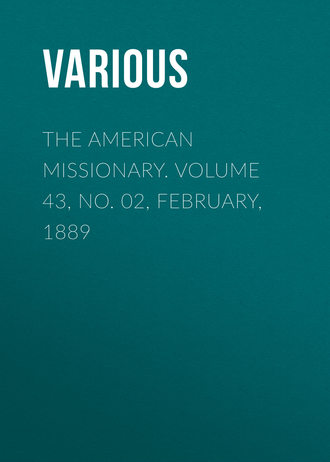 полная версия
полная версияThe American Missionary. Volume 43, No. 02, February, 1889

Various
The American Missionary – Volume 43, No. 02, February, 1889
OUR LIST OF GOOD SAMARITANS
This number of the MISSIONARY contains the annual list of our workers, who go down the Jericho road to care for those who have been wronged, the poor and ignorant, who need the Gospel. Our ministers and teachers are not like the priest and the Levite, who looked upon the poor man and then "passed by on the other side;" nor do they merely pity and utter words of sympathy. They take right hold and help. They "pour in the oil and the wine," and they build the inns—that is, the churches and schoolhouses where they instruct and help the needy ones till they can take care of themselves and help to take care of others—the most genuine kind of assistance.
It must be remembered that this requires expenditure. The oil and the wine, the inn and the constant attendance, call for money. Our constituents, who furnish this, want the work done and well done, and they are willing to pay for it. But sometimes they need to be reminded of the cost. At our last Annual Meeting, the "two pence" which they had during the year put into our hands, counted in American money, amounted to $323,147.22; and they said: "Whatsoever thou spendest more, when I come again I will repay thee." We are very careful to watch the receipts and expenditures, and we find that for the three months since the Annual Meeting, we have received from all sources $66,958.43; whereas, the current expenditures for the three months require about $86,000. We give this timely notice that they who commit to us this work may remit to us what is needed.
Let it be understood that the generous gift of that noble friend of the Negro race was not entrusted to us to do the work of the good Samaritans of the Churches. We are not permitted to use it for this. The yearly income of the Daniel Hand Fund is to do the work of Daniel Hand—no more. For this, God will reward him and generations will bless him, but he leaves the churches and individual Christians to carry on their own work as before and to reap the blessings of it. We cannot give the Daniel Hand Fund to the churches. We cannot expend it for the churches. It relieves no one of duty and privilege. It is limited also, to its use. The churches and the schools to which we are already committed call for a great increase in self-denial and benevolence.
Pastors and members of the churches, the work is increasingly great. It enlarges itself. Other denominations are increasing their efforts to meet the pressing emergency. Let it not be said that our churches—the first in the field and the most efficient—are falling behind in the ranks. Let our banner be ever at the front. Let us do our work.
AN EXPLICIT WARNING
One of our missionaries was recently at the North soliciting aid in sustaining his work. His appeal was repeatedly met by the response: "The Association is rich—it has just had a gift of more than a million of dollars." When he explained that only the interest can be used, and this for educational work only, the reply was: "This interest can be used in payment of appropriations already made for schools, thus releasing just so much for other purposes."
Now this is exactly what cannot be done. The Daniel Hand Fund is for new work, and only in the industrial, primary and normal schools. It is a priceless boon in this department, for we can now make enlargements here which were greatly needed, but for which we had not the means; but no part of this Fund can be applied to meet appropriations for other portions of the work. If our constituents will not enable us to meet those other demands, we can only report a debt; the Daniel Hand Fund cannot help us. We are confident this needs only to be understood, for we cannot believe that the 457,584 members of our churches have any wish to shelter themselves behind Daniel Hand.
PRIVILEGES OF LIFE MEMBERSHIP
The question is sometimes asked in letters we receive, What are the privileges of a Life Member in the A.M.A.? We answer:
1. The privilege of voting at the Annual Meeting. Our amended constitution says: "Members of evangelical churches may be constituted members of this Association for life by the payment of $30 into its treasury, with the written declaration at the time or times of payment that the sum is to be applied to constitute a designated person a Life Member, and such membership shall begin sixty days after the payment shall have been completed."
2. A Life Member is entitled to THE AMERICAN MISSIONARY and to the ANNUAL REPORT gratuitously, if desired.
3. The highest privilege is that of being a live member, doing all that he can to promote the interests of the Association and of the needy peoples for whom it labors.
THE AMERICAN MISSIONARY
We have two objects in printing this magazine. First, to have it read, and, secondly, to have it paid for. The main purpose is the first, of course, for we wish to have it read if it is not paid for, yet we greatly prefer to have it both read and paid for. We believe that those who pay for it are most likely to read it, and for this reason we fear that this item will be seen only by those who do not need this reminder, but we draw the bow at a venture and tell our readers that the price of the magazine is 50 cents a year.
We wish to inform the pastors and churches that we have just issued a new Annual Leaflet, brief and packed with facts, and suitable for distribution in the pews before collections are taken for the Association. We shall be glad to furnish a supply gratuitously whenever called for.
Our Annual Report, also, is ready for distribution. Those who wish it will please send us a postal card requesting it.
THE ROMAN CATHOLICS AND THE FREEDMEN
Soon after the war the Roman Catholics seemed to have made a strong effort to win the Freedmen to their faith, and many Protestants felt a good degree of apprehension that the splendors of the ceremonial and the absence of race distinction might captivate the Negro. But the effort was unsuccessful and appeared for a time to have been abandoned. It has often been said, however, that the Church of Rome never surrenders an undertaking; it may delay and wait for more auspicious times, but in the end it perseveres. There are some indications of the renewal of the zeal of the Papacy for the Negro. The article in another part of the magazine, entitled "The Colored Catholic Congress," is an evidence.
One thing is certain. The Roman Catholic Church deserves praise for its disregard of the color-line. The rich and the poor, the white and the black, bow at the same altar, and one of the highest dignitaries of the church is not ashamed to stand side by side with the black man on a great public occasion. Protestants at the North and the South must not allow the Romanists to surpass them in this Christ-like position.
We ask our friends to read Mr. Dodge's article about the school at Pleasant Hill, Tenn. One thousand dollars has already been pledged for this building, on condition that the remainder of the $5,000 be secured. We ask that this remainder be given by individuals, and not taken from Church or Sunday-school contributions—all of which are needed for current work.
NOTES FROM NEW ENGLAND
I have swapped horses—exchanged a Georgia mule for a New England thoroughbred—and hereafter the "Notes in the Saddle" will be written from this dignified seat. And what a change it is from the South to New England!
Take a map and look it over. Put down in each State the illiteracy, and make the comparison. In this good Commonwealth of Massachusetts only seven-tenths of one per cent. of the native born white population are illiterate, while in Georgia twenty-three per cent. of the native whites, and in North Carolina thirty-two per cent. of the native whites, are illiterate.
The South is pre-eminently the great missionary ground for our Congregational Churches; for Congregationalism means the school-house as truly as the church—and here in New England there is most enthusiastic sympathy with, and support of, the American Missionary Association in its great work in that section of our country committed to its care by the churches.
They want the A.M.A. to take Congregationalism into the South, and whether it organize churches mostly of whites or mostly of blacks, New England demands that a Christian of any color be admitted into any church because he is a Christian. The feeling is intense here and growing more so.
Congregationalism could have planted its churches all over the South before the war, but it would not strike hands with slavery; so, to-day the children of the Pilgrims demand that the A.M.A., in its growing work, shall stand true to the historic principles of the fathers, and not compromise Christian truth for any seeming temporary advantage.
There is great interest in the work among the American Highlanders which the A.M.A. is pushing with such vigor. I spoke in a church near Boston recently, and, after the service, a young man, his eyes bright, his face flushed, hurried down the aisle and exclaimed, "I am a Kentuckian!" I had been telling some plain and rather painful truths concerning the people of Kentucky—the murders committed there; their lack of school privileges, etc. I thought this friend might question some of my statements, but I was delighted when he said: "I thank God that some one is ready to call attention to the terrible needs of my own State. I can't get people to believe me when I tell them of those needs. I was brought up on the edge of the mountains and know them well, and I do not believe there is any spot on earth more needy than that region of my own State." He accentuated his words by a generous gift to the Mountain Work of our Association.
A good friend of the A.M.A. in Gorham, Me., put into my hands the letter of Edward Payson, in which he accepted the call of the Second Parish Church of Portland, requesting that it be sold and the proceeds go to the A.M.A. work. It is a most interesting historical document, of value to some one collecting historical literature. It was a generous gift, for this kind woman valued it highly.
The President, S.D. Smith, of the "Smith Organ Company," of Boston is filling our schools with music, gladness and praise. He has sent three organs to as many schools, within a few months, at no cost whatever to the Association, giving these grand instruments and paying freight on them to the field!
One message that comes from the work in North Carolina is of so much interest that it ought to have a place here. A teacher had been visiting her former field of labor, and she writes of this visit as follows:
"One young man, who was but a small lad when I left there, came to shake hands with me and said, 'Do you remember how you talked to me right out there under that tree? I tried at first to get away from you, but you would not let me go till I promised you I would give myself to the Lord. I thought, "Now I must not lie to that woman," and I did what I promised right there, and I have kept serving him ever since.'"
Such evidences of souls renewed is worth a life of even such self-sacrifice as this brave woman lives. Like testimony could be gathered of many of these A.M.A. missionaries.
DEATH OF PROF. A. HATCH
We are called with sadness to chronicle the death of another of our noble Christian workers at the South. Prof. Azel Hatch, the Principal of our Normal School in Lexington, Ky., closed his earthly labors and entered his heavenly rest on the 31st of December, 1888. His illness began with a severe cold, but it was soon discovered that congestion of the brain had set in, and the end rapidly came.
Prof. Hatch was born January 16, 1852, was educated at Oberlin College and at the Union Theological Seminary in New York. He entered the service of this Association in 1876, and has occupied honorable positions in the schools at Montgomery, Ala., Tougaloo, Miss., and in Lexington, Ky. In every post of duty, Mr. Hatch has shown himself to be a faithful, conscientious and Christian worker, shrinking from no duty, winning the confidence of the teachers and pupils, and showing adequate results from his efficient labors. Mr. Hatch was reserved in manner, but courteous and affable, and a man of spotless integrity and of entire consecration to the work of the Master. It is a grief to record the death of such faithful men, but it is a consolation to know that their work was done and well done. The Christian life is not measured by its length, but by the discharge of the duties allotted by the Heavenly Father.
THE FIELD
The following list presents the names and post-office addresses of those who are employed in the Churches, Institutions and Schools aided by the American Missionary Association.
THE SOUTH
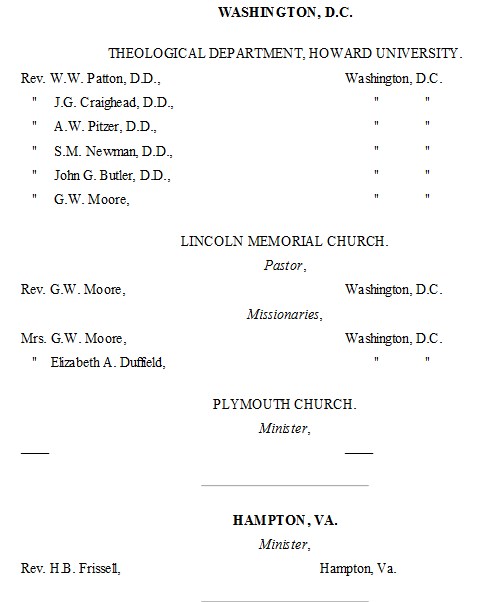
NORTH CAROLINA
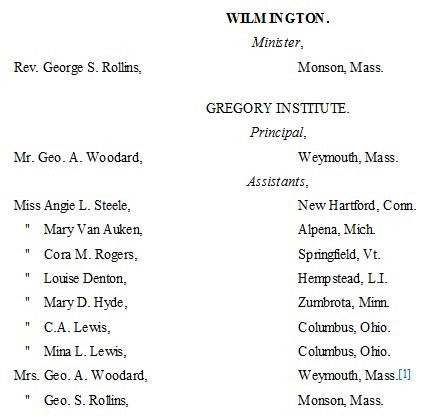
1 Deceased
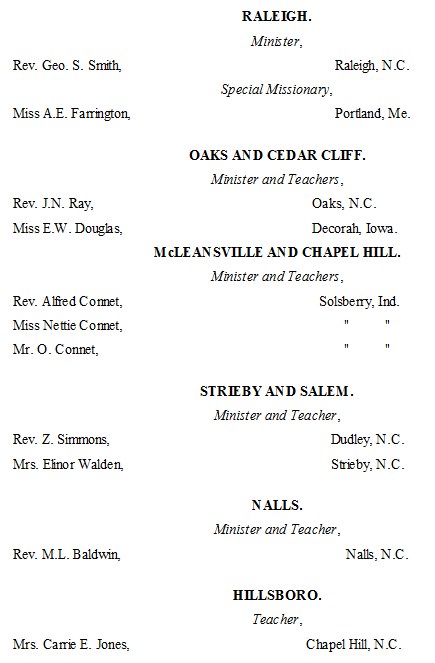
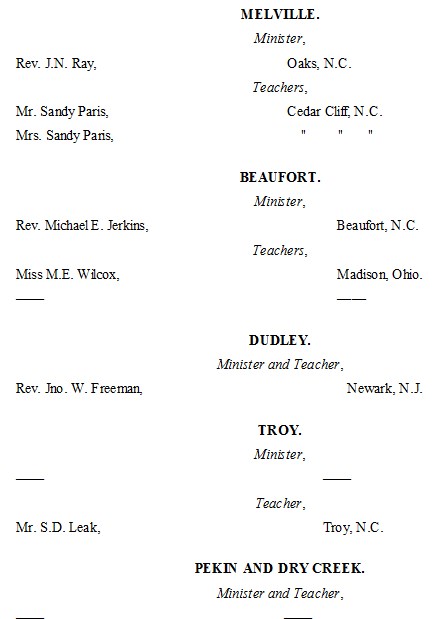
SOUTH CAROLINA
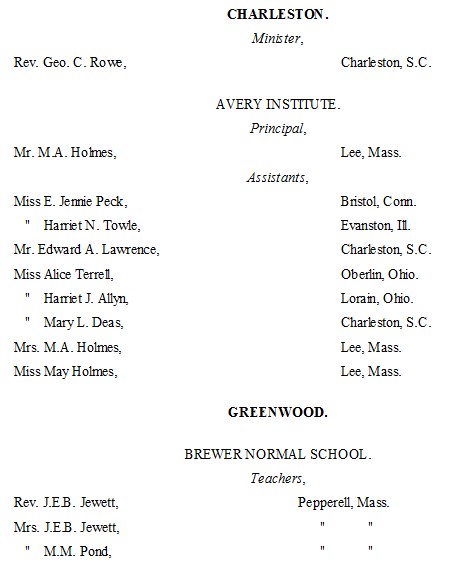
GEORGIA
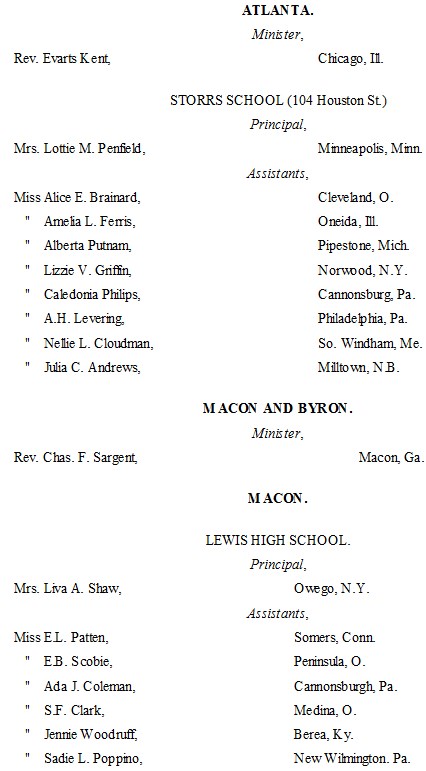
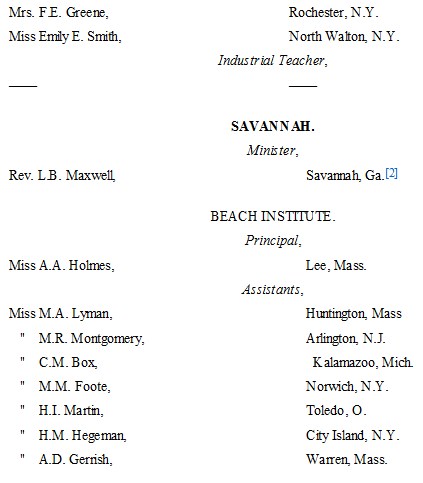
2 This church has recently assumed self-support.
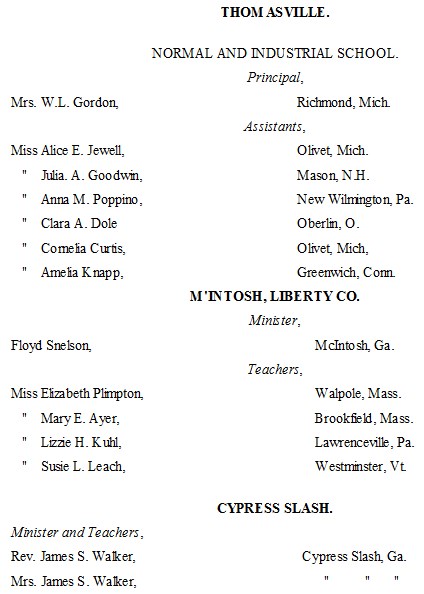
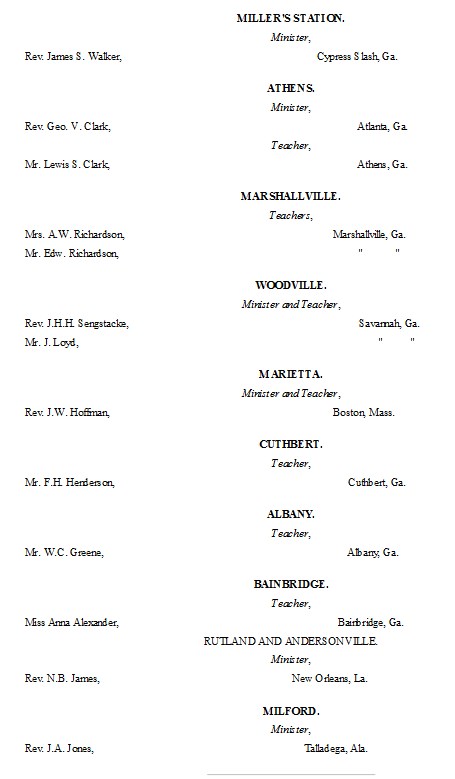
FLORIDA
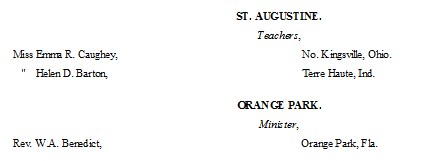
ALABAMA
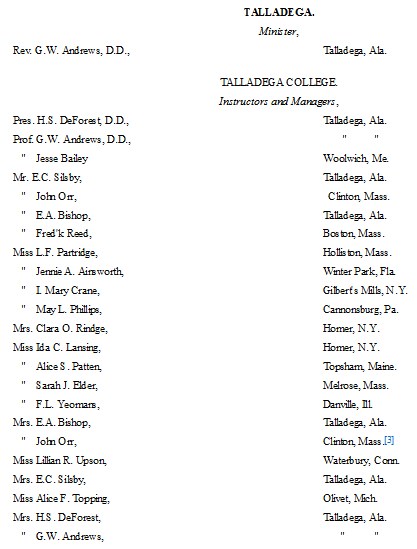
3 Deceased
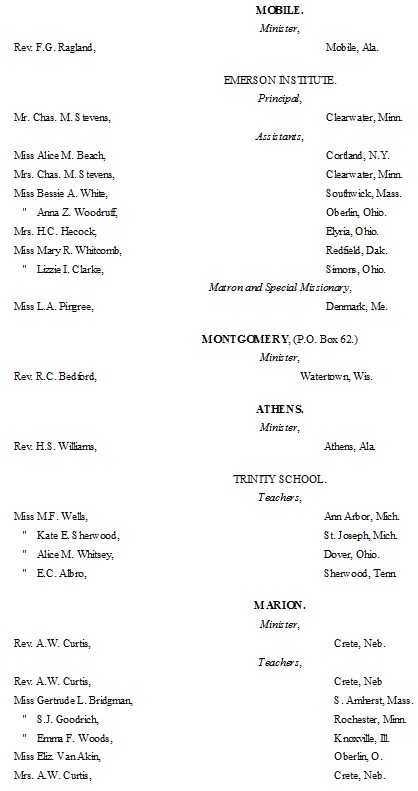
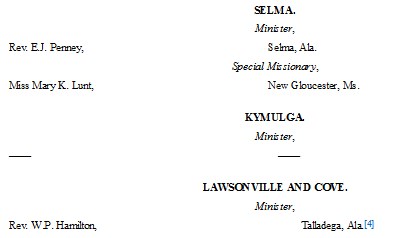
4 Part of the year.
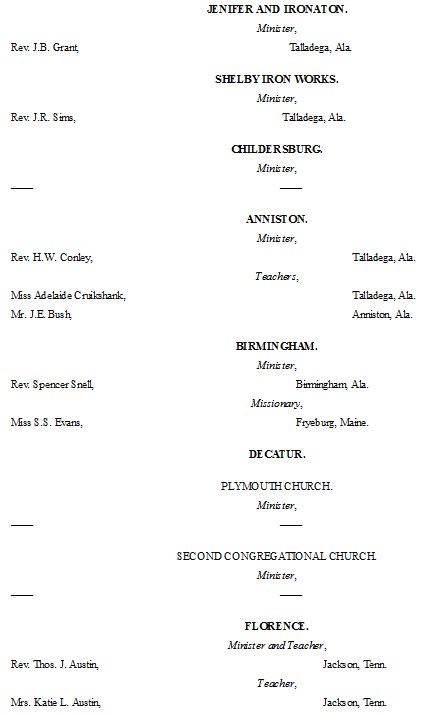
TENNESSEE
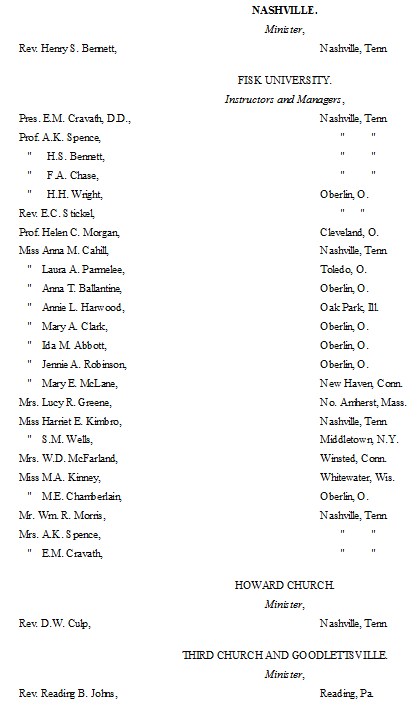
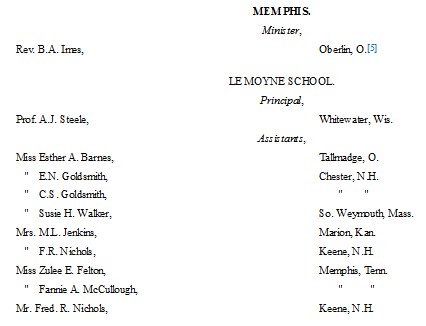
5 This church has recently assumed self-support.
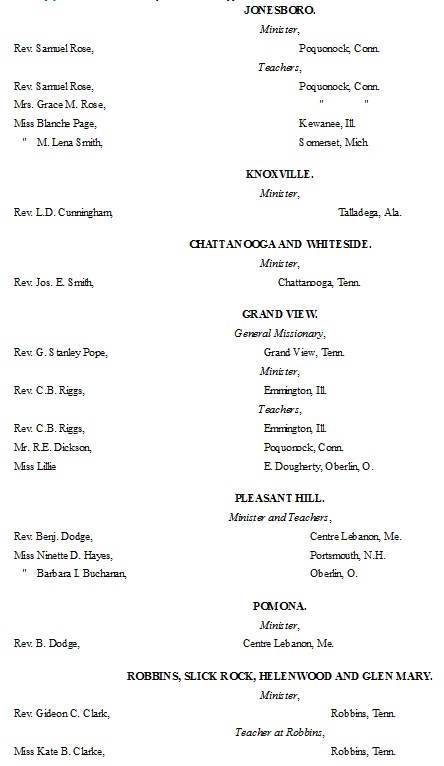
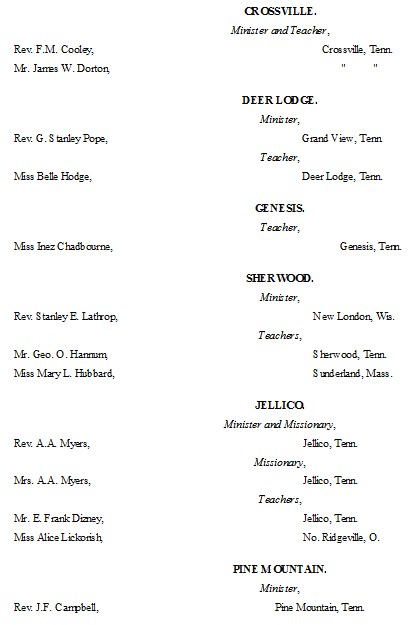
KENTUCKY
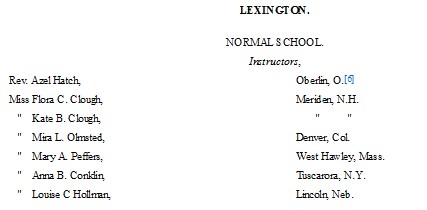
6 Deceased.
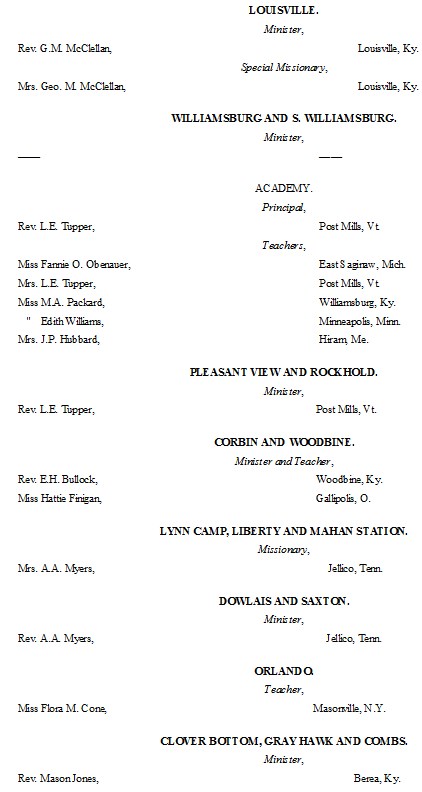
KANSAS

ARKANSAS
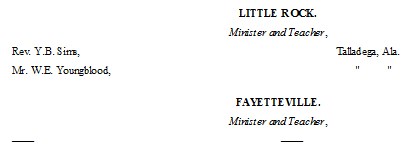
MISSISSIPPI
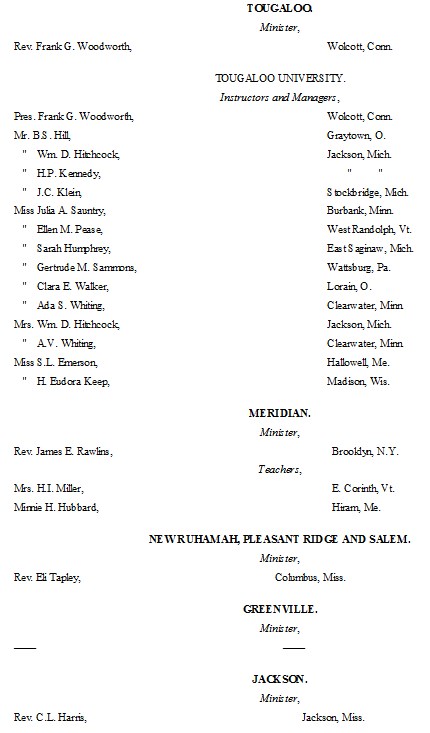
LOUISIANA
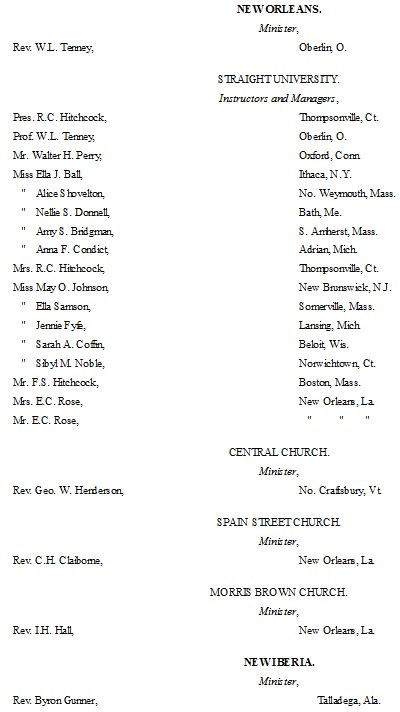
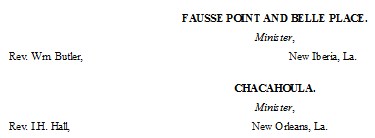

TEXAS
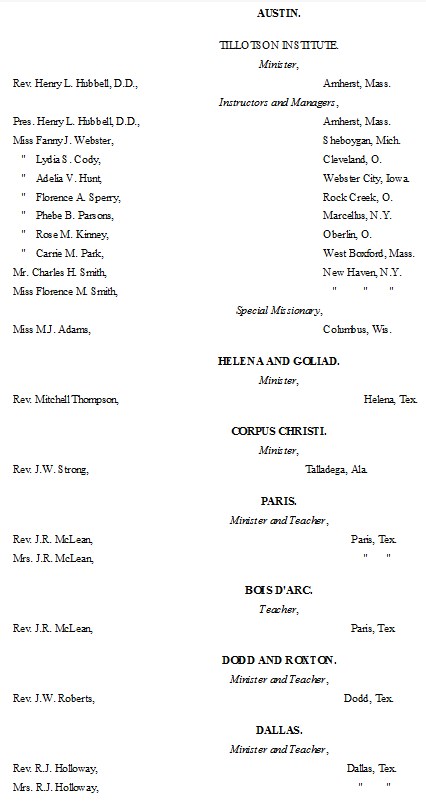
INDIAN MISSIONS
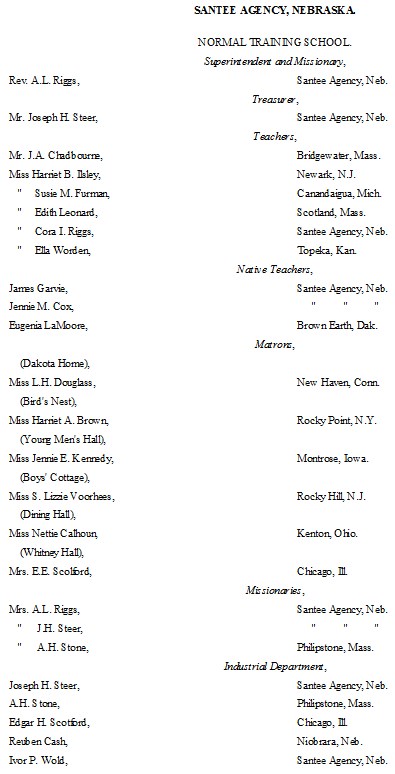
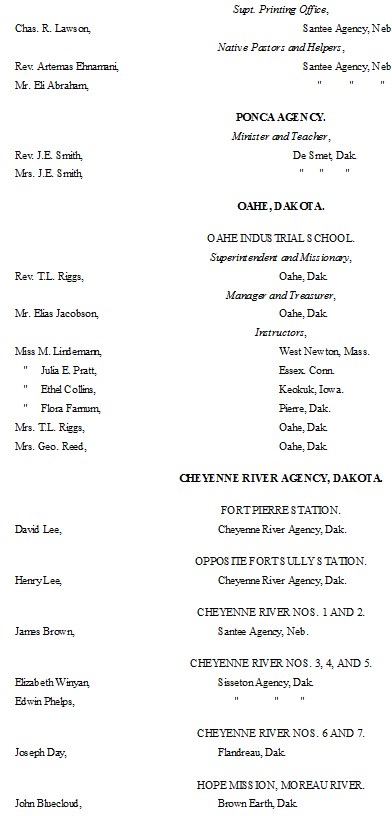
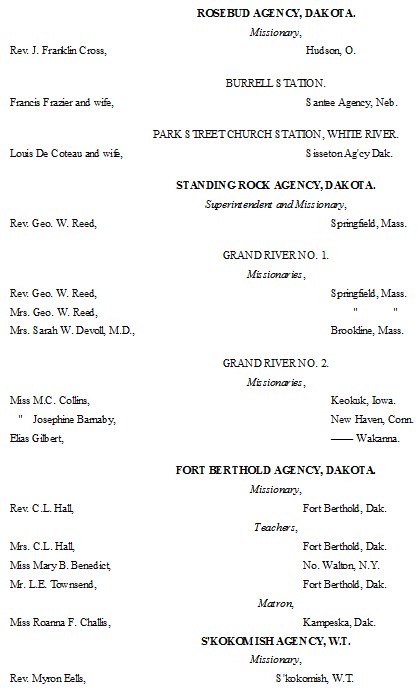
NEW MEXICO
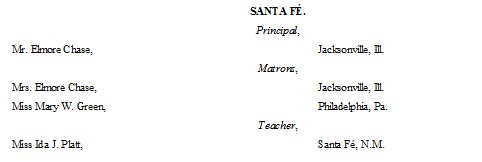
CHINESE MISSIONS
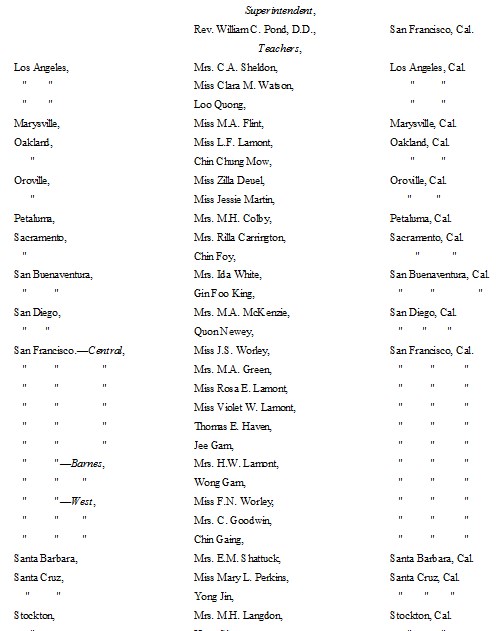
CONVENTION OF COLORED ROMAN CATHOLICS
"A National Convention of Colored Roman Catholics, composed of delegates from nearly all the colored Roman Catholic churches and societies in the country, began its sessions on the morning of January 1st, in the St. Augustine Colored Catholic Church in Washington. Every seat was occupied when Father Tolton, of Quincy, Ill., the only colored Catholic priest in the United States, began the celebration of solemn High Mass. Immediately in front of and beneath the pulpit sat his Eminence, Cardinal Gibbons, who delivered the sermon. He was clad in scarlet robes. At the conclusion of the sermon, the Cardinal welcomed the delegates in his own name, and in the name of the clergy and of the congregation. He said:
"'This gathering will mark an era in the history of the colored people of the United States, for never before have colored Catholics of the country met in convention.' He suggested that the convention discuss the education of the children—the religious education necessary to the life of the Republic. The universal level of the Catholic Church—its equality—was eloquently dilated upon, and attention was directed to the fact that a colored priest had celebrated mass in company with two white clergymen."
We quote the above from the People's Advocate, a paper published in Washington, D.C., by colored editors and in the interests of the colored people. In comments upon the above report, it adds:
"The presence of a Negro priest of pure lineage, born a slave, ordained at Rome, Augustus Tolton—the property of Stephen Elliot, as the record stands in the Vatican—the appearance of Cardinal Gibbons in his official robes to sanction the meeting, his eloquent reference to the universality of the Church of Rome that 'knows neither North, South, East or West; that knows neither Jew nor Gentile, Greek, Barbarian nor Scythian,' may mislead the unwary as to the real object of the movement. Its real purpose is to propagate the Roman Catholic faith among the colored people. So far as this meeting will secure from white Protestants a greater interest in, and a more Christian recognition of, the Negro as an equal participant in the Gospel plan, we regard it as Providential. We are not ready to concede that the Roman Catholic Church has been the friend of freedom, of education, of human rights and of progress. We do not see that anything is gained by claiming for Roman Catholicism to-day, or in the past, what is clearly not so. But the Roman Catholic Church has placed itself squarely on the doctrine of the Gospel as taught by Christ upon the question of universal brotherhood. Prejudiced as many may be by long years of training against the tenets of this church, all must acknowledge that this practice of the Romanists as manifested in the presence of a black man on terms of perfect equality, officiating at the altar of St. Augustine's Church, assisted on his right and left by white priests, in the presence of his Eminence Cardinal Gibbons, will be put in striking contrast with that of the white American Protestant churches who are willing on every occasion to sacrifice the Negro to secure the co-operation of the South on other than Gospel terms."
Rev. George W. Moore, of the Lincoln Memorial Congregational Church, at Washington, to whom we are indebted for a full account of the sessions of the Congress, comments upon it as follows:
"Mr. D.A. Rudd, of Cincinnati, editor of the American Catholic Tribune, a colored Catholic paper, was chosen permanent Chairman. Upon assuming the office he spoke favorably of the attitude of the Catholic Church towards the Negro, saying especially: 'The Fatherhood of God and the brotherhood of man is taught and practised by the Catholic Church in no doubtful terms.' He advocated the starting of Catholic schools and the aiding of those already started. The following facts were presented by the Committee on Resolutions: There are twenty colored Roman Catholic churches in the country, each of which has a school annexed. There are sixty-five other colored Roman Catholic schools; eight colored Roman Catholic orphan asylums; and three reformatories. Five thousand colored children are taught in these schools, and three hundred children in the asylums. Seven colored students are preparing to become priests. The Pope from Rome cabled his greetings in response to a cable from the Congress, saying: 'The Sovereign Pontiff gladly and proudly blesses you with all his heart.' The influence, patronage and wealth of the Roman Catholic Church are all at the service of this movement, and if Protestants build up caste-churches in the South, the Romanists will not."
AMONG THE TENNESSEE MOUNTAINS
BY EVANGELIST JAMES WHARTONMy visit to the people among the mountains was rather a departure from my usual work—that of preaching to the colored people. I have preached here about two weeks, the attendance being good, and the interest deepening as the meetings went on, until now we have more than a score who have professed to find Jesus precious to their souls.
The condition of the natives in this vicinity is very sad. Their ignorance and pride coupled make it almost impossible to do anything for them. The rough roads over the rocks and mountains make it a dangerous undertaking for them to attend church in the evenings. Several of us started for a meeting among them on a recent Saturday afternoon, with rubbers, umbrellas and waterproofs, prepared for mud and rain. We crossed a rickety old wooden bridge that had been nearly washed away by the floods, and commenced to climb the mountain side by a road that was nearly as steep as a steeple and which wended around to nearly every point of the compass, ever going up, over ruts and rocks, roots and trunks of trees, now jumping across a ravine, and next climbing a fence. At last among the thickets and brush there were some signs of life, and we came to an opening among the trees where we saw a miserable-looking old shanty. The first thought was, can it be possible that human beings live in a shed like this? We drew near and saw two women sitting with their knees up to the open fire on the hearth. They looked much surprised to see us. We told them that we were going to hold a meeting at a house a little farther on; will they go? No, they don't care to go, expectorating the tobacco juice from their mouths into the fire at the same time. We replied, "You would better go; it may be you will never have a chance to hear an Englishman again;" to which we got a reply, "Hear a w-h-a-a-t?" Whether they knew what an Englishman was, or not, or even if they ever heard there was such a country as England I cannot say; but I understand there are thousands of these people who know nothing of the outside world, and many who were never five miles away from their own door-step in their life. With a patch of ground for corn, another for tobacco, with wood for the fire, they are as contented as the President; alas, too contented!









